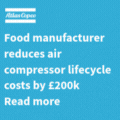
Posted to News on 24th Jan 2025, 09:18
Real-time data is key for food product safety
The Food Standards Agency has reported a 10% increase in food recalls in 2024. We have witnessed a worrying number of recalls from major food retailers such as Tesco, TK Maxx and Costco. Why are food recalls on the rise with the tech we have today?

Undeclared allergens, contamination and incorrect 'Use-By' dates are all causes of food recalls which can have significant health risks. It is a race against the clock for the food to be recalled before consumption - surely this should be something we should be leaving behind in 2024?
Technology can help in two ways: Food often travels a long way before getting to shelves - food quality can quickly diminish due to refrigeration shutdowns during stops. Real-time data and monitoring is crucial for combatting this; the technology can ensure that the food stays fresher throughout delivery, as it can monitor the temperature of the truck at all times - ensuring no dangerous food is put on shelves preventing the worrying number of recalls we are seeing.
If bad food does unfortunately make it onto the shelves, real-time data can also mean the food is quickly and efficiently recalled, as it allows for businesses to receive information immediately and locate the location instantly, massively reducing the negative effects.
Retail expert and engineer Jamil Ahmed at Solace, a pioneer in this field, explains how the speed of recall can be improved and avoided in the first place using real time data: "A real-time flow of data can be the key differentiator in helping avoid these potentially catastrophic outcomes.
"By enabling a supply chain based on seamless data movement, organisations could carry out product recalls with pinpoint accuracy, receiving information about bad batches of certain products instantaneously. With real-time data, places can react faster to remove recalled items before it's put into a shopper's basket, or perhaps even intercept the product before it leaves the factory."
Suite 118, 80 Churchill Square
Kings Hill
ME19 4YU
UNITED KINGDOM
00 44 (0) 1732 926117




